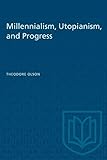Millennialism, Utopianism, and Progress / Theodore Olson.
Material type: TextSeries: HeritagePublisher: Toronto : University of Toronto Press, [1982]Copyright date: ©1982Description: 1 online resource (336 p.)Content type:
TextSeries: HeritagePublisher: Toronto : University of Toronto Press, [1982]Copyright date: ©1982Description: 1 online resource (336 p.)Content type: - 9781487581947
- 9781487583231
- 303.4/4/01 22
- HM101 .O55 1982eb
- online - DeGruyter
| Item type | Current library | Call number | URL | Status | Notes | Barcode | |
|---|---|---|---|---|---|---|---|
 eBook
eBook
|
Biblioteca "Angelicum" Pont. Univ. S.Tommaso d'Aquino Nuvola online | online - DeGruyter (Browse shelf(Opens below)) | Online access | Not for loan (Accesso limitato) | Accesso per gli utenti autorizzati / Access for authorized users | (dgr)9781487583231 |
restricted access online access with authorization star
http://purl.org/coar/access_right/c_16ec
The basis of the book is the provocative thesis that the idea of progress results from the uneasy eighteenth-century union of elements of millennial and utopian thought. Professor Olson traces changes in the major elements of millennialism since the days of Hebrew exile in Babylon, of utopianism since Plato's reflects on the ideal republic, and of progress since the unlikely merger of these very different world-views in eighteenth-century Europe. Forced to re-examine the history of their people's relationship with God, the exiled Hebrews produced various interpretations of their past and probably future. The notions of a saving élite of history as a dynamic and periodized drama, and of an end-time at which history would be fulfilled all emerged in this period of crisis. Apocalyptic writings, the literary form of millennialism, came later in the book of Daniel. Olson views Jesus and his followers as millennialists and apocalyptic expression as a characteristic Christian response to crisis. Plato's reflections on the decline of justice were taken up by Thomas More in his Utopia, a society outside history valuing object truth and justice, where the arbitrary rule of the Tudors and the collapse of the Christian commonwealth could be avoided. In the seventeenth century a number of other 'rationalist' utopias emerged. Finally these two world-views, one historical and dynamical, the other rationalist and ahistorical, the idea of progress was forged -- history becomes blind necessity willing the betterment of mankind. This dominion over nature, which has seemed both realizable and desirable to many in the twentieth century, appears the ultimate end of progress -- yet it would eliminate human will. Olson argues that our only hope for dealing with the problems created by the doctrine of progress lies in understanding it problematic origins in order to begin a constructive critique.
Mode of access: Internet via World Wide Web.
In English.
Description based on online resource; title from PDF title page (publisher's Web site, viewed 01. Nov 2023)


